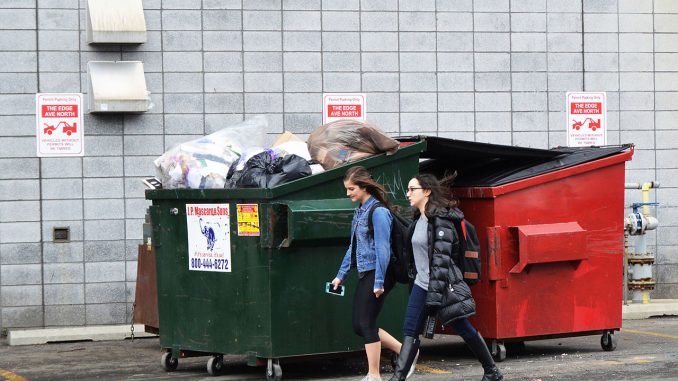
Residents of The Edge, an apartment complex leased by the university on 15th Street near Cecil B. Moore Avenue, said the complex does not have an accessible way to recycle.
Emily Cornuet, an innovation management and entrepreneurship graduate student and the waste minimization coordinator in the Office of Sustainability, said the university is not responsible for The Edge’s waste and recycling procedures because it is independent of the university.
Cornuet said her office has tried to work with The Edge in the past by sending Office of Sustainability representatives to ask The Edge’s management to change its policies and begin recycling.
“We can’t really do anything about it,” she added. “It’s a shame, but there’s nothing we can do.”
The university originally partnered with The Edge in August 2006 immediately after it opened. But Temple cut its ties in May 2013 because 1,275 beds would become available for students in Morgan Hall, which opened that fall.
In the 2016-17 academic year, the university leased several floors of The Edge. For the following academic year, the university leased additional floors to compensate for the closing of Peabody Residence Hall, which had 287 beds.
Management from The Edge declined to comment. University Housing and Residential Life could not be reached for comment despite several calls and emails.
The Edge is owned by Campus Living Village, a private company that provides 750 beds to students at the university. According to its website, Campus Living Village is one of the largest providers of higher education housing in the world, providing students with 45,000 beds in Australia, New Zealand, the United Kingdom and the United States.
The Office of Sustainability collects waste from all university-owned academic buildings and residence halls on Main Campus, Health Sciences Campus and Center City Campus, Cornuet said. All of the university’s waste is sent to Covanta, a waste-energy facility in Chester County. All university-owned residence halls recycle.
“Recycling is super important,” Cornuet said. “It’s more than just walking 10 more feet to throw your trash in the recycling container, it really has a big impact on what’s going on in the world.”
At The Edge, residents throw their garbage down a chute into a trash room. There is no separate chute or bin for recycling. Any cardboard is completely flattened and stacked on the floor of the trash room to be disposed of by workers, some residents said. But students can recycle on their own by carrying their recyclables to city-provided, public recycling bins outside The Edge.
Current and former residents of The Edge, like sophomore finance major Hannah Katzenmoyer, said there is no indication of recycling in the apartment building.
“It sucked that The Edge didn’t recycle, especially with it being such a big building with so many people, because I know that not everyone is going to take the time to bag up their recycling and take it somewhere on campus,” said Katzenmoyer, who lived in The Edge last year.
Josh Ruszas, a freshman marketing major and resident of The Edge, hopes his building will find a way to start recycling.
“It feels unnatural for me to throw plastic bottles and bags in with everything else, especially with recycling bins all over the rest of campus,” Ruszas said.
In an effort to promote recycling and green initiatives, the university is taking part in “Recyclemania,” a 10-week national recycling competition among universities and colleges that compete in reducing waste and increasing recycling.
This year, the university is trying to recycle 350,000 pounds of material including paper, plastic, cardboard and aluminum, Cornuet said. Last year, the university accumulated 372,030 pounds of recycling and 32.58 pounds of waste per person.
“Temple has 44,000 people, and we have a big footprint when it comes to what the city is wasting overall,” Cornuet said.
To promote recycling around campus, the Office of Sustainability hands out recycling bins in residence halls, as well as reusable water bottles and coffee mugs to students.
Additionally, the office hands out collection bins to offices around campus to collect old office supplies. They also encourage departments to empty their old files and materials to recycle, which officials called a “paper purge,” Cornuet said.
“Promoting recycling is a challenge, but it’s an exciting opportunity because we’ve seen a lot of improvement and we’re constantly getting to interact with students,” Cornuet said.



Be the first to comment